
Leucopogon ericoides, commonly known as the pink beard-heath, is a species of flowering plant in the heath family Ericaceae and is endemic to south-eastern Australia. It is a slender shrub with oblong leaves, and white to pinkish, tube-shaped flowers.
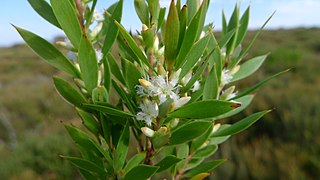
Leucopogon esquamatus, commonly known as the swamp beard-heath, is a species of flowering plant in the heath family Ericaceae and is endemic to south-eastern Australia. It is a slender shrub with mainly elliptic leaves, and short-lived white, tube-shaped flowers arranged singly or in pairs in upper leaf axils.
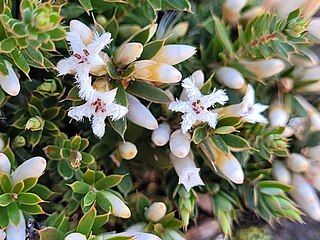
Leucopogon fraseri is a species of flowering plant in the heath family Ericaceae and is native to south-eastern continental Australia and New Zealand, where it is known as Styphelia nesophila, pātōtara, or dwarf mingimingi. It is a prickly, prostrate to trailing or low-growing shrub with egg-shaped leaves, and erect, tube-shaped white flowers usually arranged singly in leaf axils.
Hibbertia cymosa is a species of flowering plant in the family Dilleniaceae and is endemic to a restricted area of Queensland. It is a shrub with densely hairy foliage, elliptic leaves, and yellow flowers, each with fifty to eighty stamens arranged in bundles around three carpels.

Styphelia acuminata is a species of flowering plant in the heath family Ericaceae and is endemic to the Northern Territory. It is a compact, erect shrub with narrowly elliptic or lance-shaped leaves and small groups of white or cream-coloured flowers.

Styphelia appressa is a species of flowering plant in the heath family Ericaceae and is endemic to south-eastern New South Wales. It is a small, spreading to erect shrub with wiry stems, lance-shaped or narrowly egg-shaped to elliptic leaves and small white flowers.

Styphelia blakei is a species of flowering plant in the heath family Ericaceae and is endemic to inland southern Queensland. It is a sometimes prostrate, twiggy shrub with hairy branches, egg-shaped leaves with the narrower end towards the base, and small white flowers.

Leucopogon cuspidatus is a species of flowering plant in the family Ericaceae and is endemic to the central Queensland coast. It is a shrub with densely hairy young branchlets, egg-shaped to lance-shaped leaves with the narrower end towards the base, and white, bell-shaped flowers that are bearded inside.
Stenanthemum argenteum is a species of flowering plant in the family Rhamnaceae and is endemic to a restricted part of Queensland. It is a shrub with hairy branches, lance-shaped to egg-shaped leaves with the narrower end towards the base, and heads of about seven hairy white, tube-shaped flowers.
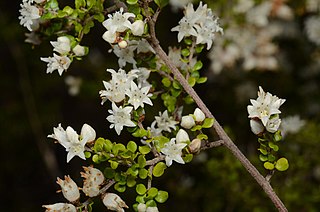
Cryptandra orbicularis is a species of flowering plant in the family Rhamnaceae and is endemic to south-eastern Queensland. It is a shrub with more or less round or kidney-shaped leaves and white to creamy-white, tube-shaped flowers.
Pimelea mollis is a species of flowering plant in the family Thymelaeaceae and is endemic to southern Queensland. It is a shrub with hairy young stems, elliptic leaves and heads of 24 to 45 white, tube-shaped flowers.
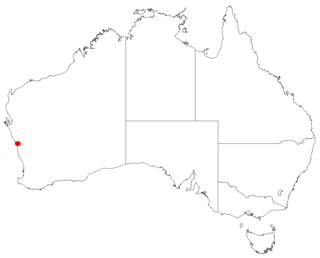
Leucopogon navicularis is a species of flowering plant in the heath family Ericaceae and is endemic to the southwest of Western Australia. It is an erect, compact shrub with hairy young branchlets, narrowly elliptic to narrowly egg-shaped leaves and erect, compact clusters of 4 to 12 white, bell-shaped flowers in upper leaf axils or on the ends of branches.
Pimelea plurinervia is a species of flowering plant in the family Thymelaeaceae and is endemic to north-eastern Queensland. It is a shrub with densely hairy young stems, elliptic leaves and heads of 24 to 45 white, tube-shaped flowers.
Pimelea rupestris is a species of flowering plant in the family Thymelaeaceae and is endemic to eastern Australia. It is a shrub with hairy young stems, elliptic to egg-shaped leaves with the narrower end towards the base, and heads of white flowers that are either all male or all female.

Leucopogon riparius is a species of flowering plant in the heath family Ericaceae and is endemic to eastern Victoria in Australia. It is an erect shrub with narrowly elliptic to narrowly egg-shaped leaves, the narrower end towards the base, and white, tube-shaped flowers arranged in groups of 3 to 5 in leaf axils.
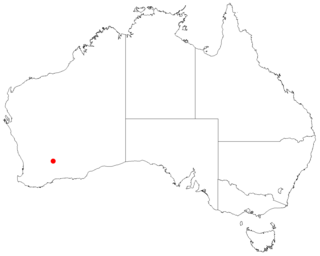
Leucopogon validus is a species of flowering plant in the heath family Ericaceae and is endemic to a restricted part of the south-west of Western Australia. It is a robust shrub with glabrous branchlets, narrowly elliptic leaves and white, bell-shaped flowers arranged in six to twelve upper leaf axils and on the ends of branches.
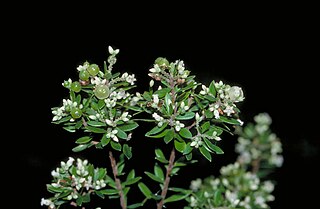
Leucopogon yorkensis is a species of flowering plant in the heath family Ericaceae and is endemic to Cape York Peninsula in far northern Queensland. It is a shrub or tree with brown, fibrous bark, softly-hairy branchlets, lance-shaped or egg-shaped leaves with the narrower end towards the base, and spikes of small, white, tube-shaped flowers.

Styphelia capillaris, commonly known as Horts' styphelia, is a species of flowering plant in the heath family Ericaceae and is endemic to a small area of south-western Western Australia. It is a dense, spreading shrub with narrowly egg-shaped to narrowly elliptic leaves and white flowers arranged singly or in pairs in leaf axils.
Styphelia chlorantha is a species of flowering plant in the heath family Ericaceae and is endemic to a small area of Western Australia. It is a low, spreading shrub with erect, narrowly egg-shaped to egg-shaped leaves with the narrower end towards the base, and green, tube-shaped flowers arranged singly in leaf axils.
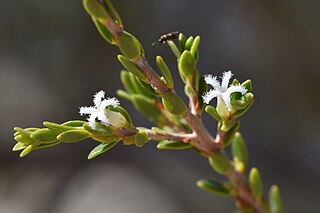
Styphelia ciliosa is a species of flowering plant in the heath family Ericaceae and is endemic to a small area of Western Australia. It is usually an erect shrub with narrowly elliptic to narrowly egg-shaped leaves with the narrower end towards the base, and white flowers usually arranged in pairs in leaf axils.













